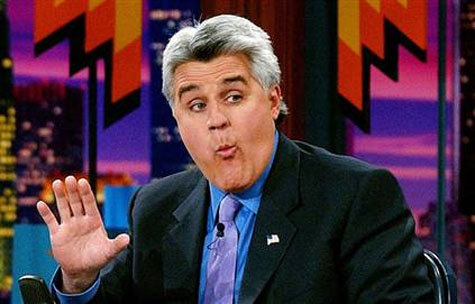
And it isn't even on the air yet. NBC's Boston affiliate WHDH has said "nuts" to the network's plan to strip Jay Leno into the weeknight 10 p.m. ET hour this fall. They'd rather run their own local news.
And remember, Leno is FROM Boston.
The real story here, as in so much of what network TV does today, lies in business ties and desperation economics. NBC slotted Leno at 10 p.m. in the first place because this network -- or should we say this GE subsidiary? -- has decided to program for short-term "margins" rather than ratings for the network, entertainment value for the audience, and longterm growth for both.
Now we see how network broadcasting is a different animal than, say, national cable. Because local affiliate stations have their own agendas. They like to make money, too. And they do it in local programming, especially late-night newscasts. If Leno lags in the ratings -- even worse than NBC's current bottom-dwelling prime-time lineup -- that hurts the size of the audience fed into their cash-cow late news. What do they care if it saves GE money? The locals could lose plenty.
And NBC could lose what literally makes it "a network" in the first place.
So we'll see how this gamesmanship plays out. As noted here in Jamie Hibberd's fine Live Feed analysis, the network is threatening to pull the Boston affiliation, and shift it to an NBC-owned also-ran in the market. Why does this conjure the cutting-off-nose-to-spite-face metaphor?
Most of the talk about NBC's Leno move has, up till now, focused on the loss of the 10 p.m. ET hour for scripted programs, which critics see as the engine that drives network quality. And I'm not disagreeing on that count. But it's much more than that. It's a potentially seismic shift in the business of how broadcast TV is put together and delivered to us, which will extend far beyond that single final hour of weeknight prime-time. We now see how it ripples into the heart of the network/affiliate relationships on which broadcast networks are built. And as that partnership turns, it changes everything everywhere at all times.
You want quality TV? One big reason the networks haven't gone even lower-brow in quick-money "reality" programs is that local affiliate stations can't take the heat. The locals hold federal spectrum licenses that can be challenged, and they depend on local advertisers reluctant to associate their products with prime-time slime.
These interconnected business levels have ever more impact on what we see. Sometimes that's good for TV worth watching -- Friday Night Lights may yet survive because NBC owns Universal, which produces the show (and gets the dollars from its DirecTV run) and which rakes in money from the show's digital afterlife (on Universal DVD and Blu-ray, iTunes, on-demand, et al). Sometimes it's bad -- networks are ever quicker to cancel shows they don't own, or reluctant to try them in the first place, because there's no back end for the network. (Or network executives keep self-owned crap on the air. This explains Kath and Kim.)
The big-gamble 10 p.m. Leno shift is revealing these many tentacles to the public. Critics have already decried the strip's displacement of scripted shows from five key hours of weekly prime-time. Now we see the affiliate effect. So let's look at something else network TV has always been predicated on, the financial back end. There isn't much to Leno, wherever he is. He's topical and timely, and pretty much old news by next week, if not sooner. No syndicated reruns. No likely DVD/download revenue, either. However, his show is really cheap to produce, NBC owns it, and it's front-loaded -- more money, right now, for less cost, right now. Who cares about building a business for the future?
Which means network TV in a tailspin, right now. NBC is accelerating the pace at which broadcasters devalue their own real estate. And that's bad for quality programming. Because the broadcast networks still remain the gold-standard there. You can talk all you want about great scripted shows on HBO, Showtime, FX, TNT or AMC, but they're doing maybe 2-3 hours of originals a week. The networks have delivered up to 20. Network shows are where most of the creators/cast/crew now making those "groundbreaking" cable originals cut their teeth to learn about the ground they had to break.
Eek, sorry 'bout that meandering metaphor. But here's another one. A sinking tide lowers all boats. The networks' loss is cable's loss is our loss as lovers of TV worth watching. The current Leno mess may only put the pedal to the metal on the entire downslide.